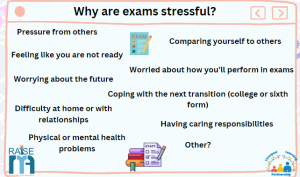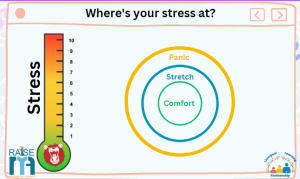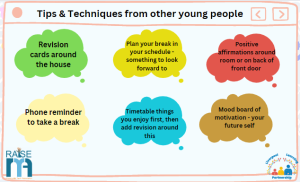Wellbeing during exams
We know that looking after your mental wellbeing during exams can be challenging.
The pressure alone can make us think, feel or behave differently.
The RAISE Team at Merseyside Youth Association met with young people from across Liverpool to ask them their thoughts about exam stress and what helps.
This page will highlight what they told us.
Why are exams stressful?
There are many reasons why young people feel exams may be stressful, and this is personal to each individual, but in this image, you can see a few reasons why we might find it a stressful time.
- Pressure from others
- Feeling unprepared
- Comparing yourself to your friends and their knowledge of a topic
- Worried about the ”what next” transition such as college, university, or being unsure of what’s next
- Difficulty at home or finding it hard to revise in the home environment
- Perhaps you’re a young person with caring responsibilities, so revision is a lot easier said than done.
These are all valid reasons why young people would find managing their wellbeing during exams stressful.
How do I know if I’m stressed?
We are all different. What stresses one person out may not stress the other. This will depend on our individual circumstances, our tolerance for stress at the time, and the resilience factors in our lives.
However, sometimes stress can be good for us! It can push us out of our comfort zones and help us try things we never thought we would and achieve things we never thought were possible.
Stress, however, can reach a level where it can feel all too overwhelming, and we can feel like we lose our ability to function or cope. This is when we really need to take a step back, check in with ourselves, and seek support.
There are different forms of stress:
- Positive stress: These things add a bit of pressure to us, but ultimately, we feel like we are coping well, learning new coping skills or strategies, overcoming, problem-solving, and developing our resilience.
- Tolerable stress: The stress here can feel a bit more intense and lasts over a longer period of time but is only temporary. This stress may feel manageable as long as we have the coping strategies that work for us and have adults around us who support us.
- Toxic stress: Where we constantly feel stressed and don’t feel we have the support or protection of strong adult relationships. Our stress responses are constantly activated.
During exam season, different exams may push you into different ”zones of stress”. So here are some questions you may want to reflect on…
- Where is my stress now? (10 being a lot, 1 being fine)
- What exams make me feel most stressed? What exams do I feel the least stressed about? Why is this?
- Who can help me in the run-up to the most stressful one?
- What helps me and wellbeing?
- Can I think of a time when I was under pressure like this and overcame it? How did I do that? Who or what helped me?
- What’s the bigger picture? How will this exam help the ”future me”?
How might stress affect my wellbeing during exams?
Exam stress, like any other type of stress, can affect our thoughts, feelings, behaviour, and even our bodies.
Here are some of things you might experience during this time:
Thoughts
- Fear of failure
- Fear of disappointing yourself or others
- Comparing yourself to others
- Talking badly to yourself
- Feeling like you can’t cope
- Feeling things are pointless
- Doubting yourself
- Believing everything is wrong or bad
Feelings / Emotions
- Anxious, worried, overwhelmed
- Upset, teary
- Exhausted
- Defeated, bored, uninterested, fed up
- Frustrated, angry
- Embarrassed, silly, stupid
- Easily annoyed
- Disappointed
- Confused
Behaviours
- Avoiding things like revision and exam planning
- Struggling to manage day-to-day life
- Lack of motivation
- Not doing things you usually enjoy
- Working too much without taking breaks
Physical symptoms in the body
- Shaking
- Feeling sick
- Headaches and dizziness
- Stomach pain
- Changes in eating habits
- Crying
- Struggling to concentrate
- Forgetful
- Restless
- Feeling tense in your body
- Changes in breathing, breathing very quickly
- Sweating a lot
- Feeling tired
What helps during exam season?
Check out this video created by young people, for young people on what could help your wellbeing during exams.
How can I look after my wellbeing during exams?
There are many wellbeing support services across Liverpool that have trained professionals to support children and young people who may be struggling.
You can find many of these services here – Support for young people aged 11-18 Archives – Liverpool CAMHS
However, some things that might help you are the following:
- Scheduling in self-care activities during your revision periods, our young people said sometimes they find it better when they are planning their revision schedule to plan in their breaks and things they like to do first and plan revision around this.
- Make an exam wellbeing plan. This will help you know what helps you for breaks, but also who your go-to people are for support during this time.
- Map out your exam journey, outlining what works for you in the run-up to the exam, on the day of the exam, and after the exam.
- Try out different revision techniques, such as the Pomodoro Technique (25 minutes of revision, 5-minute break on a loop) or the Feynman Technique Process (like teaching the topic to someone else and reviewing the gaps).
- Set a reminder on your phone to take breaks
- Write a letter to your future self to open on results day (write one if you pass and one if you fail); better yet, you and a friend write a letter to each other.
Exams are important. However, they do not define us.
Additional Resources and Links
Joseph Roberts: Spoken Word – Dealing with Exam Stress
Young Minds – Exam Stress: a Guide for Young People





